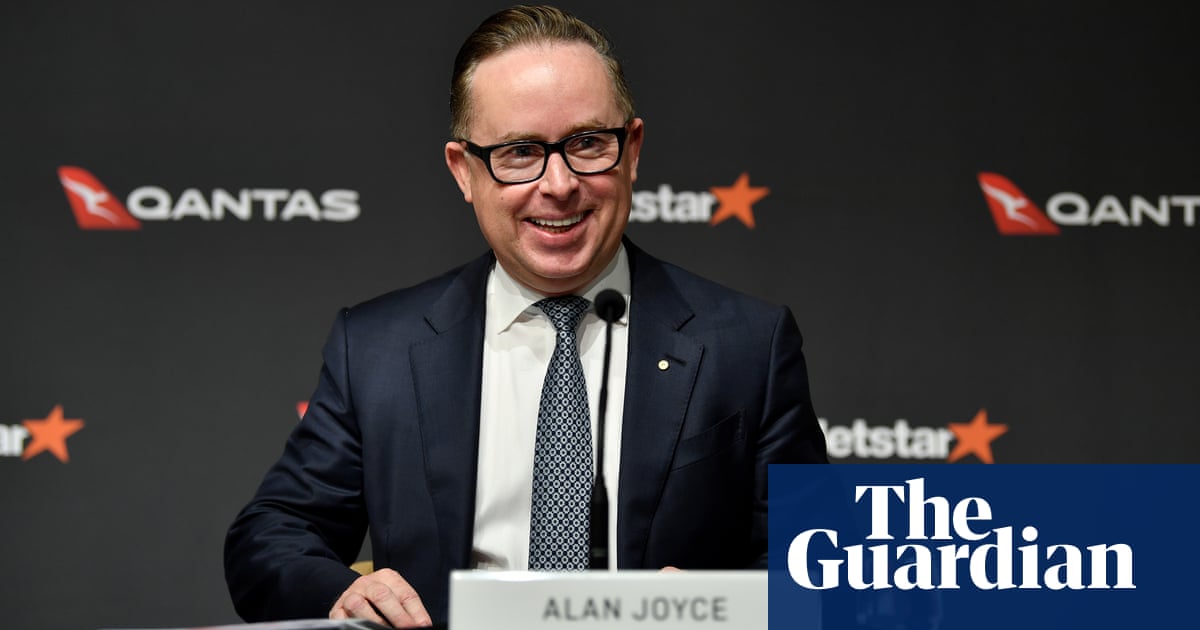
Qantas Airways has soared out of the disrupted pandemic era to post a record $2.47bn full-year underlying profit, backed by strong travel demand and high ticket prices.
The 2022-23 results mark a stark change from a year earlier, when it fell to a $1.86bn loss.
“This is a remarkable turnaround, three years in the making. And it’s been hard,” Qantas’ outgoing chief executive Alan Joyce said. “Fundamentally, travel demand is extremely robust.”
Australian international air fares have surged even after major costs, including jet fuel, have fallen from the high prices recorded early last year after disruptions to global oil supply.
All financial metrics accelerated at Qantas. The return-on-invested-capital measurement, which tracks how well a company generates profits, increased to 103.6%, an almost mythical figure.
This compares with a return of less than 20% before the pandemic.
Qantas’ domestic earnings before interest and taxes (EBIT) – an indication of profit margins – jumped to 18.2%, representing a 50% increase in profit margins over the past six years. Typical profit margins for domestic aviation operators in Australia have traditionally been between 8 and 10%.
International margins including freight were at 11.7%, while Jetstar’s margin was 9.5%.
The Qantas results will be a bitter pill for some travellers, who have experienced a disrupted period of travel, punctuated by very high air fares.
Vanessa Hudson, the incoming CEO who will replace Joyce in November, said there was room to further improve Qantas’ financial situation. “It’s not as good as it gets,” she said.
Its strong recent financial returns have been described as “obscene” by the Transport Workers’ Union (TWU) after the airline received generous government pandemic payments and outsourced ground handler jobs.
Sign up for Guardian Australia’s free morning and afternoon email newsletters for your daily news roundup
The airline’s huge income flows will be distributed around. Qantas announced a $500m share buyback, a strategy used by companies to reward shareholders and lift a stock price.
All staff will receive a $500 travel credit.
Joyce also announced the airline had approved orders for 24 new widebody aircraft, a mix of Airbus A350s and Boeing 787s that will arrive from 2027. The 787s will replace its current A330 aircraft.
The new orders mean Qantas will ultimately receive 24 A350s, which will will progressively replace its fleet of 10 A380s – a popular but less fuel efficient plane – from 2032.
Qantas’ recorded a $1.7bn net profit for 2022-23, compared with a loss of $860m a year earlier. The industry prefers to use the $2.47bn underlying profit measure, as this strips out one-off charges and other irregular payments to give a more accurate reflection of performance.
Joyce said the airline was in a strong position after being 11 weeks shy of insolvency during the pandemic upheaval.
“Despite cost-of-living pressures, survey data shows people are planning to spend more on travel over the next six months and less on homewares, renovations and even alcohol.”
The airline said domestic flights were now above pre-pandemic capacity, although international flight numbers were still behind.
Qantas also announced domestic and international sales, as well as an initiative to reward customers with frequent flyer points or status credits, but only those who have flown recently with the airline.
Frequent flyers who have flown with the airline at least once in the past 12 months will be able to choose either 1,000 points or 30 status credits, and those who have flown 10 or more times in the same period will get either 5,000 points or 75 status credits.
TWU national secretary, Michael Kaine – said “this is $2.5bn of dirty money reaped from illegal outsourcing, overzealous redundancies, price-gouging, hoarding cancellation refunds, and the decimation of service standards”.
Australian Council of Trade Unions president, Michele O’Neil, said Qantas’ results were achieved through increased costs to the average flyer and being “an airline hell bent on driving down terms and conditions for its workers to maximise its profits”.
“Qantas workers know that a huge share of this profit is the result of outsourcing their jobs to multiple companies … (and) customers know all too well the impact of cancelled or delayed flights, lost luggage and regular inconvenience, whilst paying more for their ticket while fuel prices fall,” O’Neil said.
At a press conference announcing the results, Joyce shot down accusations that Qantas and Jetstar have been hoarding take off and landing slots at Sydney Airport to shut out smaller airlines such as Rex and Bonza from introducing rival services.
A parliamentary inquiry on Wednesday heard evidence that while Qantas attribute the almost one in 10 cancellation rate on the Sydney-Melbourne route to poor weather and air traffic control issues, that in some months almost half of cancellations occur on days with no reported windows of such incidents.
On Thursday, Joyce said sickness and technical were responsible for other cancellations, and accused Sydney airport of being “monopolistic” and seeking to maximise profits.












